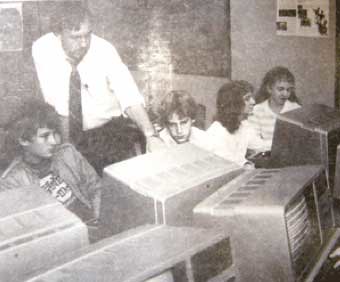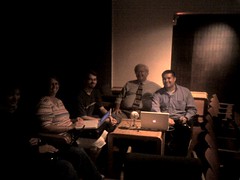Australian educator and blogger, story the other day about a conversation he overheard at StarBucks (StarBucks in Australia?). Moller said,
…the kids were talking about an advertisment that comes up at the movies warning people about the risks of downloading movies online. The advertisment challenges the viewer that because they wouldn’t steal a purse or break in to a house and steal a TV they shouldn’t download a movie because it is the same thing. Makes sense to me – Stealing is Stealing!! However, the insight these teens put on the conversation was interesting indeed. One said that it was a stupid argument because if someone just left a purse sitting out in the open where it was easy to get to then of course you would just take it. He continued, stating that because movies and music is so easy to download and because it is out there in the open for anyone to take so easily then it is ok.
21st Century Educator » 21st Century Ethics
Moller continued…
I think it is an evolution of social networks and the thinking that is being developed by young minds of today. To think that stealing is ok just because it is easy says to me that they have lost a sense of reality and which in turn distorts their understanding of what is right and wrong.
I think that Brett makes a very good point here, that right and wrong appears to have given way to convenience. He wonders what the motion picture industry might do to better protect their assets, but I wonder what we might do, as an education industry, to help students better understand the ethics of information.
Right and wrong is the core of the issue, but I think that value is where the confusion actually lies. The movie files that these youngsters were talking about, were not left out in plain view from neglect or disregard. It is the technology that makes it so easy to take digital property, not that it got lost. It would actually be easier to walk into someone’s yard and take their outdoor furniture, or even their car. But I doubt that the youngsters Moller overheard would even consider doing this. I think youngsters see information, as property (made of bits), differently from the way that they see an object, as property (made of atoms).
So how do we teach students to value information? I think that we must first come to value information ourselves. Teachers must explicitly and conspicuously practice information ethics every day, and this goes much deeper than merely adding citations to our handouts.
What do we (the education institution) value? We value answers. We value performance. We value achievement. When a student turns in a report, research paper, drawing, or what ever, we mark its level of performance, and then give the work back to the student or throw it away. I think that we need to integrate into our teaching and learning experiences, a value for our students’ information work. As students start to perform more digital work, I think that we should archive those information products into a public digital library, so that other students can visit the work, read it, look at it, listen, and watch it. It shows that there is value in their information.
Beyond that, I would suggest one more analogy for these students. Admittedly, it is a difficult place to get a good foot hold, because our children are not trying to make a living. They are not responsible for generating income to support themselves and their families. So it is hard for them to understand. But I would ask them, “If you are using an MMORPG (Massively Multiplayer Online Role Playing Game), and have built a dwelling with the resources you earned in the game, and someone comes along and steals that home — would that be right or wrong?”
technorati tags:literacy, ethics, education, warlick, technology
Blogged with Flock





 I’m home for a few days, and took a minute, this morning to leaf through my mail. I won’t even tell you how old some of this stuff is. But one of the items near the top of the stack was the brochure for the 2007 CUE Conference in Palm Springs next year. I picked it up and scanned through, paying particular attention to the invited speakers (Deneen Frazier Bowen, Peter
I’m home for a few days, and took a minute, this morning to leaf through my mail. I won’t even tell you how old some of this stuff is. But one of the items near the top of the stack was the brochure for the 2007 CUE Conference in Palm Springs next year. I picked it up and scanned through, paying particular attention to the invited speakers (Deneen Frazier Bowen, Peter 
 The Wall Street Journal syndicated a story a few days ago,
The Wall Street Journal syndicated a story a few days ago,